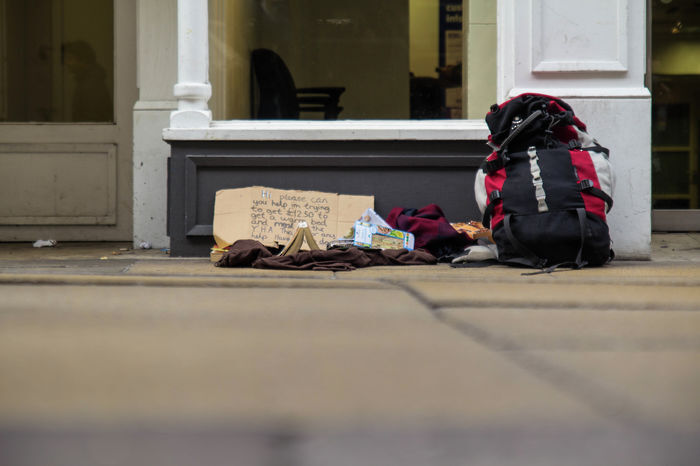King’s College student accommodation to house rough sleepers during pandemic
Cambridge City Council will manage 20 rooms in Bene’t Street Hostel until the end of August

Bene’t Street Hostel, a 31-room off-site residence which ordinarily houses third-year undergraduate students, will accommodate rough sleepers from 23rd April until 31st August.
The Hostel, located between The Pint Shop and Zizzi restaurant, was chosen as it is the only King’s accommodation with no students currently in residence.
Students had vacated the residence by 28th March and it has been used by the Council to house rough sleepers since last Thursday (23/04).
The scheme to use the Hostel, which was arranged by King’s and the City Council, was in place before a motion was passed at CUSU Council on Monday evening. The motion encourages colleges to make accommodation available to ‘those in need’.
The Council committed to guaranteeing accommodation for every rough sleeper on March 24th, following the announcement of a UK-wide lockdown.
Neither King’s College or the Council would disclose how much the use of the Hostel is costing the Council. The College insists that it is a “standard rate” which was “suggested by the Council, not by King’s”.
The Council told Varsity that they are "satisfied that it is a sub-commercial amount which reflects the risks involved in letting the accommodation."
Students paid between £164.57 to £190.01 per week for a room in the Hostel during this academic year.
College housekeeping staff prepared the building for the Council's re-use but the upkeep of the Hostel is now the responsibility of the Council. A contractor will be used for housekeeping services and maintenance will be conducted by the Council’s maintenance team.
Those who will reside in the Hostel will not have kitchen access, as this would have “presented various problems with regards to both fire safety and social distancing”.
Students who left Bene’t Street Hostel at short notice in March, following the University’s encouragement for students to return home, have raised concerns to Varsity about possessions which they had left in their rooms.
The College explained that all possessions have been removed from the rooms being used by the new residents.
The arrangement with King’s follows national guidance which mandates that Councils must make efforts to house rough sleepers during the pandemic. Richard Johnson, Cambridge City Council’s Housing Councillor, explained that the Council is "working with partners" to provide "a comprehensive level of assistance for some of the most vulnerable people in our city.”
Food is provided for residents through "a consortium of local homelessness charities and local cooks and kitchens... by an army of unpaid volunteers three times a day."
Johnson describes this activity as "truly humbling," adding that, for food provision, the "Council have not needed to put in any funding yet."
Cambridge has been labelled the UK’s most unequal city and the council and other outreach agencies deal with around 30 rough sleepers at any one time. The number of rough sleepers that the Council is supporting has increased by three times during the Covid-19 lockdown.
The Council have raised concern that not all rough sleepers are currently in accommodation. Of the 142 people which the Council understands to be sleeping rough in Cambridge, only 104 had been placed in Council-managed accommodation as of 24th April.
So far, 17 people have refused accommodation and a further 21 people have either abandoned accommodation, have been asked to leave accommodation or have not turned-up to accept accommodation.
Johnson hopes that, after lockdown, rough sleepers who previously refused accommodation but are now accepting help will “continue this engagement with a view to eventually obtaining a stable tenancy” and “break the cycle of homelessness which some sadly endure.”
He continued by explaining that the City Council will require Government funding to be able to support the homeless. “If the Government want to eliminate rough sleeping by 2024,” he said, “they must give us the appropriate support to meet this goal and not heap extra financial pressure on us instead.”
He stressed: “ten years’ worth of austerity has been more painful for local authorities than of any other part of the public sector and, despite Boris Johnson’s rhetoric, it continues to bite for councils like ours.”
In March, the central Government distributed additional funding of £3.2 million to local Councils to use to assist rough sleepers, as part of the wider £1.6 billion boost to council’s finances to deal with the immediate impacts of Covid-19. Cambridge received £24,750 out of the total £3.2 million, a figure calculated on the number of rough sleepers observed in the annual street count, which took place in November.
Johnson points out that this figure “woefully underestimated the larger-than-usual number of rough sleepers and vulnerable people” which require housing support due to the Covid-19 lockdown.
As of 27th April, the Council had already spent “more than ten times” the amount it was allocated, from the Government, to address homelessness during the pandemic.
 Comment / London has a Cambridge problem 23 December 2024
Comment / London has a Cambridge problem 23 December 2024 Lifestyle / Am I better than everyone? 26 December 2024
Lifestyle / Am I better than everyone? 26 December 2024 Arts / What on earth is Cambridge culture?20 December 2024
Arts / What on earth is Cambridge culture?20 December 2024 News / Cam Kong? Ape-like beast terrorises student24 December 2024
News / Cam Kong? Ape-like beast terrorises student24 December 2024 Features / Home for the holidays: bridging identities25 December 2024
Features / Home for the holidays: bridging identities25 December 2024






